#capetian
Text
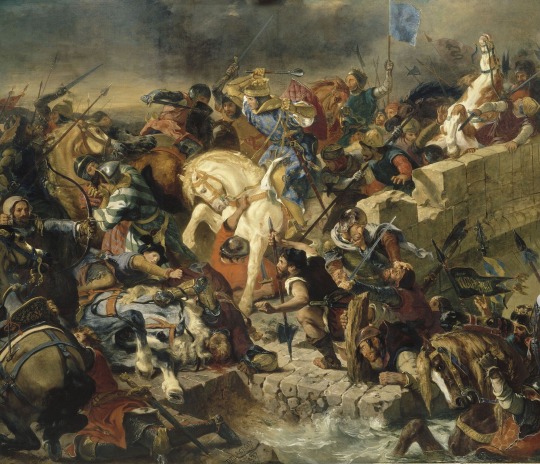
The Battle of Taillebourg, 21 July 1242 by Eugène Delacroix
#battle of taillebourg#art#eugène delacroix#middle ages#medieval#history#knights#france#louis ix#saint louis#french#europe#saintonge war#saintes#versailles#capetian#angevin#england#english#bridge#henry iii#charente#river#kingdom of france#kingdom of england#alphonse of poitiers#hugh x of lusignan#richard of cornwall#mace#king
98 notes
·
View notes
Photo

History Events on July 08
0 notes
Text
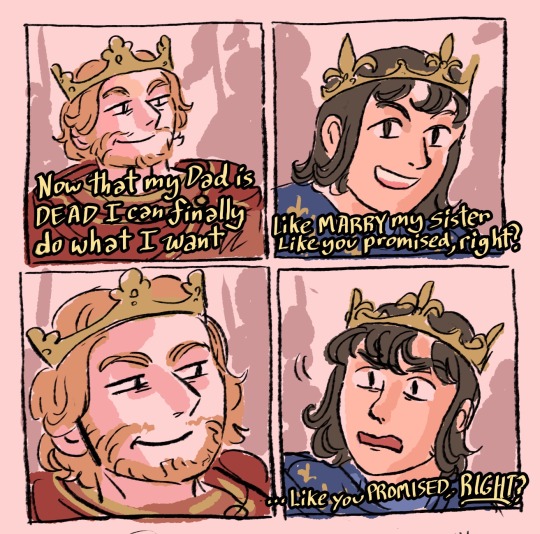
Situationships in 1189 on the way to the Third Crusade
#richard the lionheart#philip augustus#12th century#richilippe#memes#my art#doodles#The third crusade#historical memes#Tfw u got another bride negotiation on the way#But u gotta pretend like ur cool#Plantagenets#Capetians
87 notes
·
View notes
Text
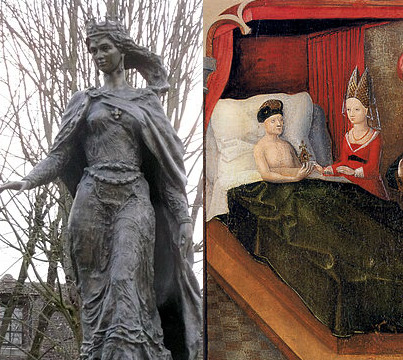
Anne:
She introduced the name "Philippe" to the french court, which they loved, and remarried after her husband's death, which they hated. Regent for her son Philippe Ist until he came of age.
Baudouin:
Drained the swamps around Valenciennes, making the surrounding area way healthier to live in. Regent for his nephew-in-law Philippe Ist until he came of age.
Dates indicated are dates of regency.
11 notes
·
View notes
Text
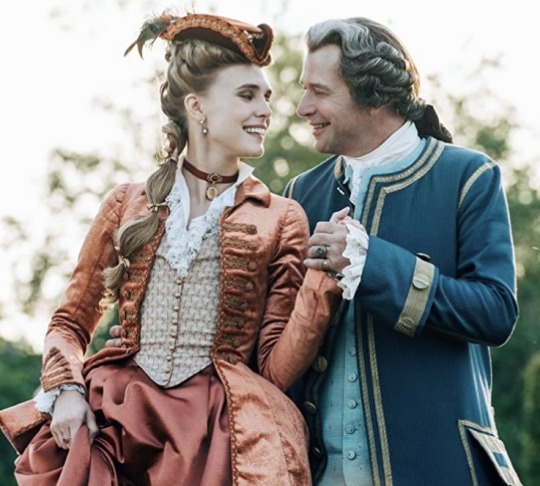
Gaia Weiss as Madame du Barry & James Purefoy as Louis XV (Marie Antoinette, 2022)
#marie antoinette 2022#james purefoy#gaia weiss#im pleased to report that purefoy is everything i expected of him as XV#like when you think ‘i wonder what purefoy would do as louis quinze?’ and you get a delightful image: that’s exactly what he delivers#less pleased to admit that this series is not quite as fun as versailles 2015#i mean points for effort but it’s also fighting in the shadow of the sofia cuppola and not quite breaking free tbh#it’s an uphill battle on both fronts but like it is trying#it’s still a reasonably fun constume romp (unless you’re a capetian dynasty scholar)#anyway these 2 are having fun#genuinely his mel brooks good-to-be-the-king vibes are immaculate#him trying to explain the birds and the bees mechanics using a tomato was a highlight
57 notes
·
View notes
Text
French Kiss: Tale of the Revolution, Ch. 15: The City of Light
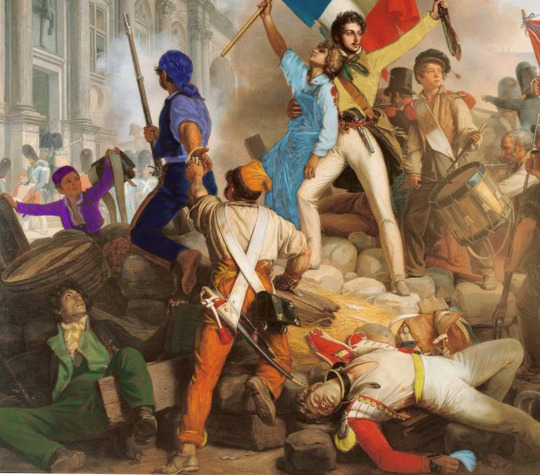
Prev - The City of Light - Next - All - [ AO3 ]
WC: 2350 - CW: weapons, angst, arguing
10 July 1789
It was nearly dark by the time they arrived in Paris, but the streets were still hot and humid, the sweet, fresh air of the countryside a memory. Janus didn’t wait for either Logan or Patton to climb down from the driver’s perch and slammed open the carriage door the moment the wheels stopped turning. He carried with him the bag from Remus, his wig tucked safely in its box under his arm.
“Janus, wait—” Patton called after him, but he slipped down the stairs to the back entrance of the church basement.
“Let him go,” Logan muttered. “He has every right to be angry with me. What I said was reprehensible.”
Patton rested an impossibly strong hand on his shoulder and smiled sadly. “What you said was… pretty bad.” He gave his shoulder a little squeeze. “But you were speaking out of worry and… hurt.”
“Of course I’m concerned, but…” Logan shook his head. “What would I have to be hurt about? Janus seems perfectly happy with this arrangement, he’s the favorite of the future King. You should have seen the way he smiled when he… he—” His protest withered under Patton’s knowing smile. “He cannot know,” he pleaded, gripping Patton’s arm with both hands..
Patton pulled Logan into a hug and rubbed his back. “Your secret’s safe with me, Logan.” He shrugged and pulled back enough to grin up at him. “Well… I think Remy figured it out, too, but he’s just a busybody sometimes.” He squeezed his arms around Logan one more time, then leapt down from the perch and offered his hand. “Come on down and get Remy to make you something. I’ll take care of Naif and Petit. ”
“It… it would perhaps be best to give Janus a little more time to cool off before I attempt another apology.”
Nodding, Patton smiled up at him. “Now, go on, I’ll meet you inside.” He gave Logan a little nudge as he led the horses to their borrowed stable at the end of the road.
Logan watched him go, then took a deep breath and retreated into the warm glow of Café de Foy.
~~~
Janus didn’t light the lamp in the tiny room he shared with Logan and the city’s fetid heat had made their pathetic little pellet stove unnecessary. He stubbed his toe on the foot on the bed and swore. Perfect way to end the night. How dare Logan judge him without even hearing what he had to say? How dare he assume this was mere lust? He never even considered, never even asked if there was more.
He stripped out of his clothes in the dark, and hung them in their little shared closet. Not that either of them needed much space. Logan had two shirts and two trousers. One waistcoat, which he was already wearing. Janus had acquired a few additional pieces, mostly from Logan, actually. “You do it better justice,” he’d murmur when one of his wealthier parishioners gifted him something out of guilt.
Slamming the door shut, Janus threw himself onto his bed and pulled the threadbare sheet up to his neck. Despite the worst the humid July night could throw his way, his bed felt cold and entirely too large. Had it really taken only two weeks for him to become accustomed to not sleeping alone?
Evidently.
Hours passed. Starlight shifted and the moon set, darkening the room further. The low, steady click of Logan’s prized clock marked the time, droning on and on as though nothing had happened, as though Logan was simply already asleep and quiet in his own bed. But the room was empty, the only sound to accompany the clock was Janus’ own breathing. After what felt like half the night, Logan quietly shuffled down the stone steps, foot falls echoing in the silence of the night. The door was nearly soundless as it opened and Janus lay still, feigning sleep.
Logan would want to talk. Would want to confess, to gain his absolution the way he’d grant it to his parish. Janus was in no mood to grant him anything.
He listened as Logan prepared for bed in the dark. His heart clenched at the quiet sniffles from the other side of the room. Logan was crying. Why the hell was he crying? Logan lingered near the closet and after several minutes, he murmured, almost to the clothes themselves, “I’m so sorry, Janus.” His voice was barely louder than a breath. Had the city been awake, it surely would’ve drowned out his words and Janus would have never heard what he said next.
“If you love him even half as much as I love you, I understand.”
Janus froze in his bed, afraid to breathe, afraid to reveal he was awake and had heard Logan’s confession. Blood roaring in his ears, he didn’t hear what else Logan said before he gently pressed the wardrobe door shut and climbed quietly into his own bed.
11 July 1789
Sleep was elusive but not impossible and the dawn had just begun to soak the horizon when Janus’ eyes finally slipped shut. By the time they reopened, bright mid-morning sun streamed through the little cracks around their closed shutters. Logan was gone. Janus squinted against the light. He’d left the shutters open, letting in the thin starlight and the chance for a bit of a breeze in the sweltering night. Logan must have shut them when he’d left, perhaps hoping to give him a bit more sleep. The city was busy, voices raised and more foot traffic past their window than usual. Everyone was likely trying to get in a bit of work and errands and visiting before the heat of the afternoon took them all.
Janus rose and dressed quickly. He had no way of knowing when exactly Logan had left, and he hoped to catch him in the café before too much of the morning had passed.
The city buzzed with energy, hushed voices speaking fervently at each corner. What had happened while he was gone? He pushed open the heavy oak door to the café and let his eyes adjust to the dim interior. Logan sat with his back to the door, hunched over the table, a bit of graphite in his hand and a short stack of parchment near his elbow. Engrossed in his work, he barely moved when the door clunked shut, but still his head jerked up when Patton called his name.
“Janus!” he cheered. “Let me get you a coffee!”
He nodded and made his way to Logan’s table. Head bowed, Logan watched him from the corner of his eye. “May I join you?”
Logan looked up and nodded, eyes wet. “Please,” he whispered.
They were both quiet as Patton brought a pot of coffee, letting his chattering about the heat, the new—gently stolen—water pump he and Remy had installed to support the growing afternoon crowds from the Sorbonne. “Those University students do tip well,” he said with a little shrug as he refilled Logan’s cup. “They want to pretend they’re working class but their purses are heavy,” he laughed. Finally, he smiled at each of them and excused himself before returning to the kitchen.
Logan searched for his words in the swirls of steam coming off his mug. Janus waited and slowly sipped at his cup, the smoky taste almost painting a smile across his face. He’d missed Patton’s coffee. The world’s everything at their fingertips in the palace kitchens and they couldn’t compete against the love that little server infused in his brew.
“I am sorry,” Logan finally said, ripping back Janus’ attention. “I was wrong to make assumptions and to…” He shook his head. “I said horrible things and I am sorry, Janus. I hope you can forgive me.”
“Lo,” Janus reached across the table and Logan flinched when he hesitated before taking his hand. “It’s not what you said that hurt,” he frowned, fingers tapping against the side of Logan’s fingers. His knuckles were more pronounced, as were the bones in his wrist. His fingertips were cold, even in the heat of the day. “It hurt,” Janus admitted. “But what was worse was that you didn’t trust me, that you believed that I would betray everything for… for pleasure. ”
Logan hung his head. “I don’t really believe that,” he whispered. “I… I was… was afraid. Afraid for your safety. It’s an incredible risk and…” He set down his cup and gripped Janus’ hand between both of his. “How do you know he won’t have you arrested? Have you…”
“He won’t.” Janus said. “He’s known who I was since the night we met.”
“What?” Logan hissed, leaning forward. “How could you—”
“I didn’t tell him. He had a courtier ask about ‘Sir Henri Juriste.’ Apparently my cover wasn’t as strong as we’d believed. The real Juriste is now at least thirty years my senior.” Janus rolled his eyes and finished his coffee. “But Remus waited for me to feel safe enough with him to admit the truth.”
“He’s a fool,” Logan muttered.
Janus yanked his hand back and glared at his friend. “Excuse me?”
“I do not—” he sighed and folded his hands in his lap. “I mean he brought a known imposter into his palace. Into his bed.”
“That’s enough,” Janus’ voice was quiet but sharp.
“You could have caused him real harm,” Logan explained, softer. “How do you not see that?”
“I would never hurt him.”
“And if the cause demanded it?” Logan straightened in his seat, glaring back just as hard. “Have you forgotten what you’d gone to Versailles to do?”
“And I’m doing it. Prince Remus listens to my advice—”
Logan scoffed. “Perhaps in his private chambers.”
“It is not like that.” Janus insisted. “I am doing what you would advocate for. I’ve even gotten him to read bits of your treatise—”
“You what?”
“None with your real name,” Janus crossed his arms over his chest. “It seems the Prince isn’t the only one you take for a fool.” He lowered his arms and leaned closer. “Like it or not, Prince Remus is the eldest son. He will take the throne when the King dies and King Remus will be amenable to our cause and will have the power and the heart to enact real change.”
“What has happened to you?” Logan sat back, eyes narrowed as he stared at his oldest friend like he’d never seen him before. “You were the best of us, you used your talents for the cause.” He slapped his hand on the table, punctuating each sentence. “You never forgot where you came from, never forgot what we were fighting for! And now?” Logan looked at him like something he’d scraped off his boots. “Now you're betraying our brotherhood, betraying our ideals, all in the name of some false love. You’ve known him for weeks , you didn’t tell him your real name until just now. That’s not love.”
“And I suppose you are the great expert on love?” Logan’s face fell and Janus wished he could rip his words back. “Lo, I—”
He only sat up straighter and finished his coffee. Patton was at his side before the empty cup had touched the scratched table top. Logan waited silently while Patton poured, then shook his head at Janus. “You are blinded by the needs of your heart. And your flesh.”
Janus' hands shook and he stroked his ring. “Are you quite certain it is I who is blinded, Father Gérault?”
Logan paled and looked away. Before he could respond, the café door slammed open and a half-dozen of the Garde Royale stomped inside. Conversation in the café dissolved, the faint bubble of the oat gruel Patton was preparing roared in the quiet.
“Good morning, gentlemen,” Remy called out from the back room, clearly drawn by the sudden lack of ambient noise. “May I get you some coffee?” He raised a steel tankard. “On the house.” When they ignored him, he stepped closer, his full height suddenly obvious. “Or perhaps something stronger? A light ale on a summer’s day?”
Janus’s eyes widened when the palace steward stepped inside, peering through the relative darkness at each patron. His eyes landed on Janus and he pointed at their table.
Remy stepped forward, just barely in their path. “Surely it doesn’t take six guards to have a conversation with one of my patrons.” Janus looked around them. The guards had chosen their position well, blocking both the main entrance and the side door. There was a hatch hidden behind the counter, but there was no way Janus could reach it without being seen.
The steward ignored Remy and approached the table where Logan and Janus sat. “By order of the Dauphin, you are to come with me , Sir Juriste.”
“You have the wrong person,” Logan said in his ‘reasonable’ voice. He rose, shoving his papers to the side then held out his hands in benediction. “This is my friend, he is not a noble.”
“Well, perhaps your friend has been less than honest with you,” the steward remarked and pointed at the gold bracelet hanging from Janus’ wrist. “He wears the Dauphin’s fleur-de-lis. Besides…” The steward managed to sneer and simper at the same time. “I know his face.”
“It’s alright, Lo,” Janus said as he stood. “At least you get to say you were right after all.” His joke fell flat when he met Logan’s eyes. "Be safe," he murmured and gave shoulder a squeeze as he drew close and whispered in his ear. "I'm sorry, too."
The guards had fanned out, standing between Janus and the other patrons. And Patton and Remy. “Very well,” he said to the steward, chin held high. “More guards outside, I presume?”
The steward nodded and moved with staccato steps to the door. One of the guards held it open, and two led the way. The remaining three watched the patrons—and Remy—muskets at the ready. Just before he was swallowed by the glare of the midday sun, Janus nodded to Logan and Patton. And then he was gone.
The guards followed and the café door slammed shut again. Voices erupted in the café and Patton leapt out from behind the counter. “We have to do something!” Logan nodded, about to speak. He was interrupted by a loud voice carrying over the din.
“Oh, now you want to take action?” Colére spat from the corner, feet propped on the table. “Where was this fight when the people were ready to take up arms to defend our right to assemble?" He rose to his feet. "Where was this fight when the people were ready to defend our right to be heard in the Assembly?”
“You wanted to storm the palace with a handful of boys who could scarcely lift a musket.” Logan’s voice was low but the former priest knew how to keep an audience. “That’s not being heard, Lucas, that’s being massacred. They’ve likely taken Janus to the prison at the Bastille.” He gripped Colére’s shoulder. “There are more guns than prisoners there. We will not win this by might alone.” Colére’s eye twitched, but he listened and took his seat.
“We need information,” Logan said, and turned to address the small group that had assembled around him. “And we need a plan.”
#French Kiss: Tale of the Revolution#ts janus#ts remus#ts logan#ts patton#ts roman#ts lucas#Janus Robespierre#Crown Prince Remus Capetian#Prince Roman Capetian#Father Logan Gérault#Patton Cœur#Lucas Colére#dukeceit#demus#French Revolution#AU of the French Revolution: What would happen if Robespierre fell in love?#sanders sides#sanders sides fic#sanders sides fanfic#ts fanfic
23 notes
·
View notes
Photo
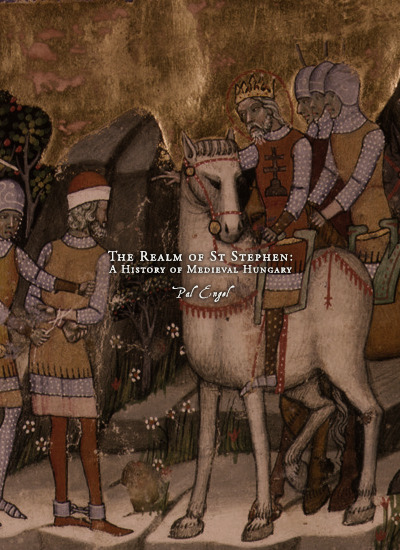




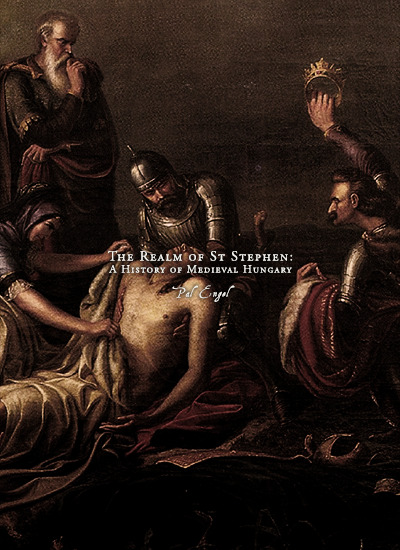
Favorite History Books || The Realm of St Stephen: A History of Medieval Hungary by Pál Engel ★★★★☆
This book was written for the non-Hungarian reader who wishes to discover what happened in the Carpathian basin during the Middle Ages. It is to be hoped that nobody living in that region who has strong national feelings will find comfort in it. Each of the nations of the region has its own vision of the past, incompatible with that of the others, and it was my firm intention that none of these visions should be represented in this volume. ...
Hungary is now one of the smallest countries of Europe. This book, however, is concerned with the medieval period, and here the name ‘Hungary’ will refer to the former kingdom of Hungary, which (even without the kingdom of Croatia which was once united with it) was more than three times larger than the present-day republic, and also somewhat larger than the combined area of Great Britain and Ireland. It extended over the whole of the Carpathian basin, including not only present-day Slovakia, but also considerable parts of Romania, Ukraine, Austria, Yugoslavia and Croatia. Although the kingdom of Hungary ceased to exist as an independent country at the end of the Middle Ages, politically it survived as an autonomous part of the Habsburg Empire until the end of the First World War in 1918.
The medieval kingdom of Hungary was born in a geographically well-defined region that is usually called the Carpathian basin. This is the drainage-area of the middle Danube valley, and is named after those mountain ranges with 2000 metre peaks that border it to the north, the east and the south. It is divided by the Danube into two parts of unequal proportions, and its centre is surrounded by mountain ranges of medium height. The region to the west of the Danube has been called Transdanubia since the period of the Ottoman occupation when the capital of the country was temporarily moved from Buda to Pressburg, on the northern bank of the river. The climate here is predominantly temperate, with a relatively heavy rainfall. This is a fertile landscape with hills of modest elevation interrupted by valleys and basins, and with the Balaton, the largest warm-water lake in Europe, at its heart. There are also mountain ranges – the Mecsek in the south-east, the Bakony and the Vértes north of the Balaton – but none rises higher than 600 metres. The landscape east of the Danube is profoundly different. The Great Hungarian Plain, which stretches without a single hill from Budapest to Oradea in the east and Belgrade in the south, can be regarded as a kind of appendix to the Eurasian steppe. The climate is rather more extreme here, with hot, dry summers, but the region is abundantly supplied with water by its main river, the Tisza, and its tributaries, which, before the nineteenth-century regulation works, meandered across the Great Plain. These rivers were flanked by marshlands, swamps and inundation forests, and also by fertile pastures and meadows, offering favourable conditions for fishing and livestock breeding. To the north, east and south-east of the Great Plain, in present-day Slovakia and Romania, there are mountain ranges that become progressively higher as one travels outwards from the Plain. They were formerly extremely rich in minerals; but, with the exception of the valleys, they have never been propitious to human settlement. Consequently, until the late Middle Ages these mountains were covered by forests and largely uninhabited, and colonization of them continued into the early modern period.
#historyedit#house of arpad#hungarian history#capetian house of anjou#medieval#european history#history#history books#nanshe's graphics
23 notes
·
View notes
Text
Capétiens vs Plantagenêts: a matter of suzerainty.
It was also his position as suzerain which gave Louis VII the chance of interfering in and inflaming the quarrels which raged in the Angevin family. This was an effective means of weakening his great antagonist. Henry II and Eleanor produced a large family, and reared four of their sons to the age at which custom demanded that they should be provided for. Their eldest son Henry was granted Normandy in October 1160 and was associated with his father on the throne of England in 1170. Richard was given Aquitaine in 1169 and Geoffrey Brittany in 1175. John, the youngest child of Henry and Eleanor, was not old enough to be entrusted with any estates until the very last years of his father's reign, and by the time he came of age all the available lands had been given away. As Duke of Normandy, Duke of Aquitaine, Count of Poitiers, the sons of Henry II came to perform homage to the King of France and became his men. It was in vain that Henry II sought to utilise the Norman procedure of pariage to maintain the unity of his continental territories in favour of his eldest son, the "Young King" Henry. (Under pariage the eldest son succeeded to all the heritable property and was alone answerable for it to the suzerain; each of his brothers received a share, but held it of him). This device could not be put into full operation in Aquitaine, which was not part of Henry's heritage but Eleanor's. And when she granted it to Richard, he owed homage not to his father or his eldest brother, but to the King of France. The Young King Henry had done homage as Duke of Normandy to Louis VII in October 1160. When he repeated his homage in 1170 it was made to embrace Anjou, Maine, and Brittany as well. At the same time Richard did homage to Louis for Aquitaine.
It is true that in 1174 Henry II compelled his sons to perform homage to him after their rebellion, but this new homage did not necessarily annul their homages to the King of France. Henry II himself had done homage to Louis VII in 1151 and again in 1169, and was to perform it yet again to Louis's successor, Philip Augustus, in 1180. Thus throughout the conflict between Louis VII and Henry II the French king's suzerainty was affirmed and recognised. This did not save Louis from defeats at his vassal's hands. Nevertheless, to judge from the Toulouse affair in 1159, Louis' suzerainty occasionally cramped Henry's style, and put him in the wrong in the eyes of contemporaries, including the barons of his continental fiefs. To play the rebel vassal was hardly prudent for a king when many of his own vassals were rebelliously inclined. It was not that the idea of rebellion itself shocked feudal society. On the contrary, it was one of the legitimate courses open to a vassal needing to safeguard his rights against the encroachments of his suzerain. But in the disputes between Louis VII and Henry II, Henry was the law-breaker as well as the vassal in revolt. For his rebelliousness against an impeccable suzerain there could be no justification.
It may be objected that Louis VII was constantly intriguing with Eleanor of Aquitaine and with Henry II's sons. But after all Eleanor, as Duchess of Aquitaine, was herself a royal vassal. Two of Henry's sons had done homage to Louis. Another, Geoffrey, by dint of his father's vassalage, was the French king's rear-vassal. And the king had, as suzerain, not merely the right but the duty to concern himself with the welfare and harmony of his great vassal's family, to ensure that a proper settlement was made on the sons. It would be unfair to accuse Louis of hypocrisy; nor did Henry ever complain that the French king was making trouble in his family. Louis' own grievances against Henry were many and varied, and Henry never made a serious effort to deny their validity.
Thus from 1154 to 1180 Henry II had the appearance of a vassal engaged in unjustifiable revolt against his suzerain. This line of conduct undermined his own position. It constantly reminded the baronage of the Angevin fiefs that the King of France was Henry's suzerain- if only because his suzerainty was so often invoked. And it helped to prevent the fusion of the individual elements of the Angevin empire on the continent. Provincial separation, already too strong for Angevin rule to subdue, was reinforced.
Robert Fawtier- The Capetian Kings of France
#xii#robert fawtier#the capetian kings of france#louis vii#henry ii of england#aliénor d'aquitaine#henry the young king#richard the lionheart#geoffrey plantagenêt#john lackland#jean sans terre
7 notes
·
View notes
Text
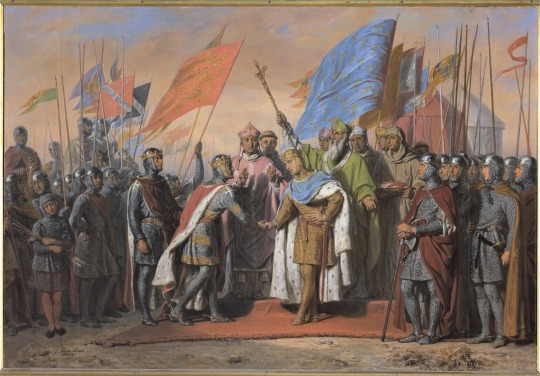
Meeting Between Philip II King of France and Henry II King of England, at Gisors, 21 January 1188
by Gillot Saint-Evre
#philip ii of france#henry ii of england#king#kings#meeting#plantagenet#capetian#gisors#art#painting#history#england#france#medieval#knights#knight#middle ages#europe#european#armour#banners#gillot saint evre
34 notes
·
View notes
Text
thanks to @hypokeimena, have finally started name of the rose after years of thinking “i should probably read that” & not doing it. currently journeying thru First Day After Nones and having an absolutely riotous good time. i can’t wait to see how many more disapproving monks we can meet and have ethical debates with in the span of a single day/presumably several hundred more pages
#box opener#bookbox#started strong with the old 'ironical manuscript provenance' foreword and got only stronger with the immediate introduction of an antipope#nothing to object to there. using my vague memory of the one book i once read about capetian kings... magnificent
9 notes
·
View notes
Text
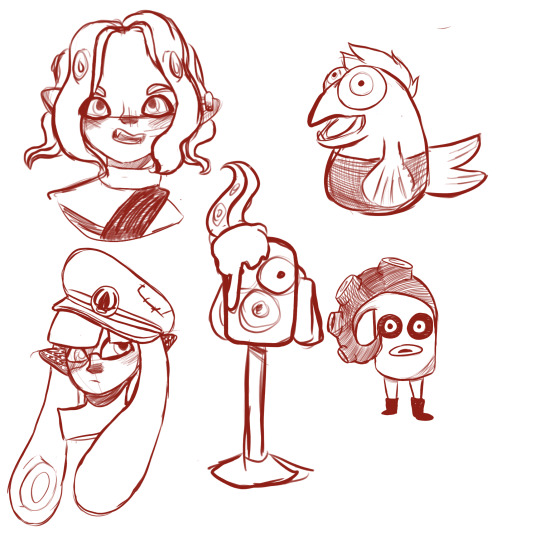
Some splatoon doodles from today !! Just finished splatoon 3 story mode and I loved it a lot!!
#digital art#procreate#digital illustration#splatoon 3#splat#spla2n#splatoon oc#octo expansion#octoling#little buddy#captain#agent 3#Capetian tartar#splatoon octo expansion
15 notes
·
View notes
Text
plugging myself directly into the Bad Plantaganet Novel Mainframe
#ollie considers#i should reread the accursed kings#i realise that was capetians but at least they're all...#deliriously fucknasty
2 notes
·
View notes
Text
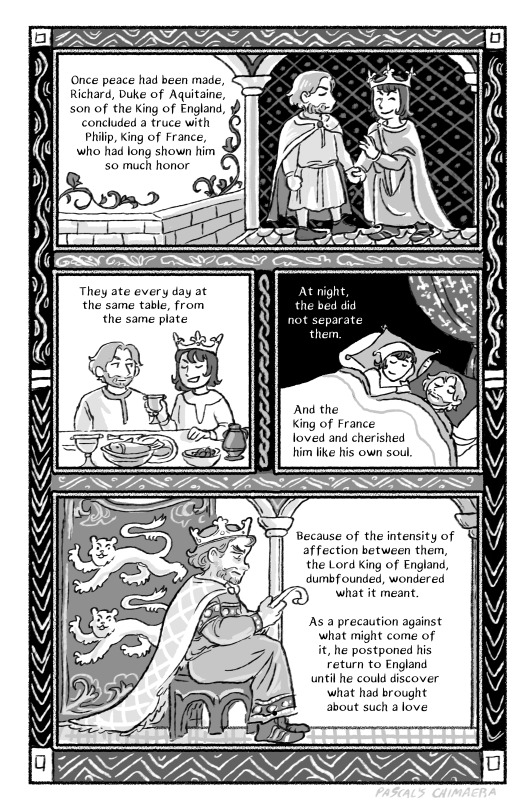


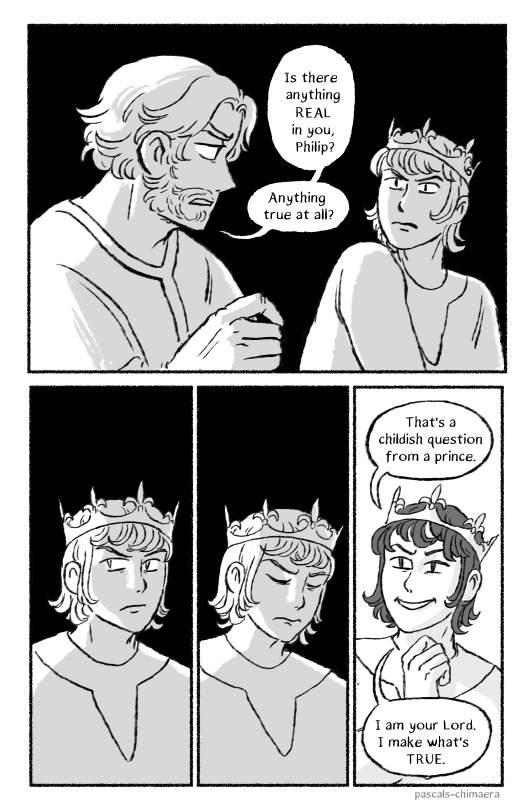

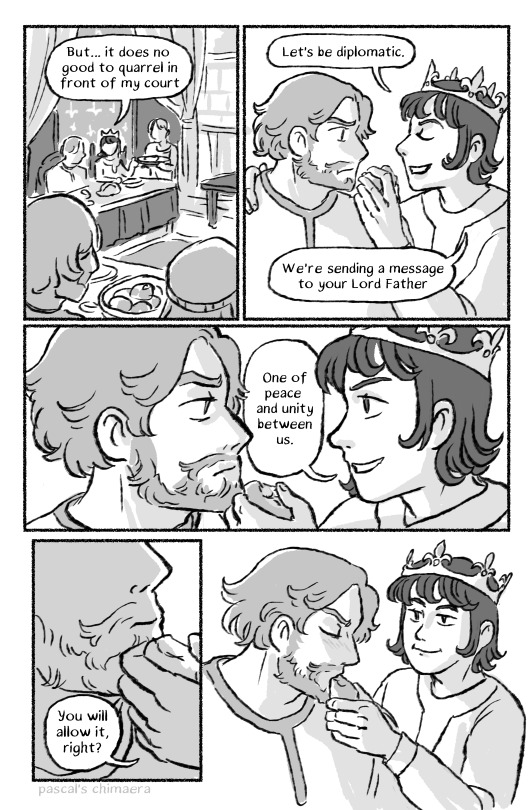
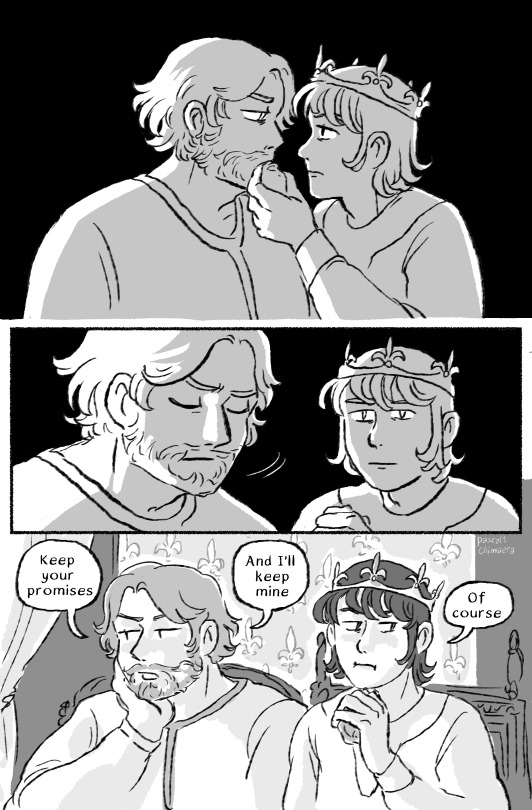
"In Exchange for Honor" by Pascal's Chimaera
My short Richard/Philip comic I’ve been working on! Inspired by the famous Gesta Henrici II/Roger of Howden quote, although less about the bed sharing and more about the weirdness and artifice of public performance of relationships, hehehe. Lots of room for delusion, but also fun thematics to explore...
Anyways, I have more comics on the way I want to work on eventually in this vein... But you can see a bonus comic as well as more of my more detailed notes and thoughts from my reading my site post here.
#my art#richard the lionheart#philip augustus#richard/philip#richilippe#my comics#12th century#medieval#historical rpf#unnatural animals#growling out for gore#no man's boy#comics#historical slash#angevinyaoiz makes the angevin yaois#long post#plantagenets#capetians#got a teeny bit of the philip/geoffrey in there too. heh#cant help myself
101 notes
·
View notes
Text
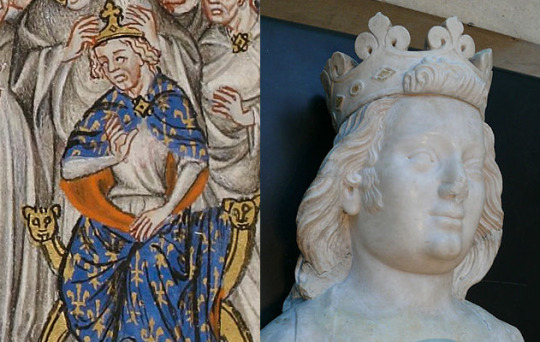
Philippe:
T'was his reign that first established what would be known as Salic Law (girls are excluded from the royal succession) because he was in conflict with his sister Joan.
Charles:
Failed to be elected Holy Roman Emperor. His sister married Edward II of England and since the English do recognize girls in the royal succession, that gave them a claim to french territories when Charles died without an heir.
7 notes
·
View notes

